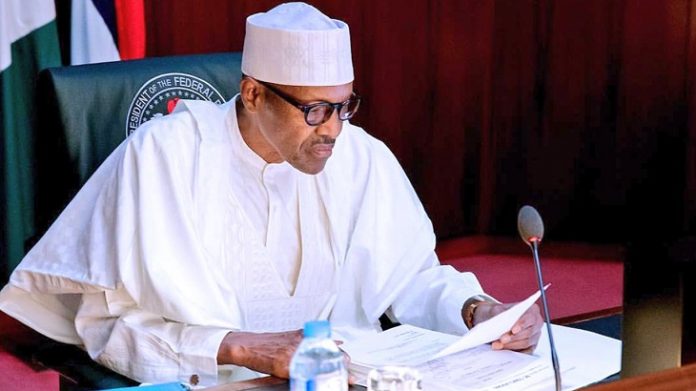By Emeka Alex Duru
For President Muhammadu Buhari, the celebration over his victory at the February 23 rescheduled Presidential election, is understandable. With torrents of pre-election endorsements on the Peoples Democratic Party (PDP)’s candidate, Atiku Abubakar by local and international analysts, many had given the President little chance to return. The policies and actions of his administration which had seen the country drop on major indices of development, had also not worked in his favour, at least in the court of public opinion. To critics therefore, Atiku, who had pledged a new dawn in the fortunes of the country, had appeared favoured for the office. But in a rather stunning development that proved book makers wrong, the President made a surprising return for another four years in the saddle.
By the early morning of Wednesday, February 27 – clearly, four days after the poll, when the Independent National Electoral Commission (INEC), officially announced Buhari the winner, the outcome had been known by most Nigerians. The announcement was thus, elicited excitement among his supporters but sustained the suspicion in the opposition that the election was rigged. Despite the attendant mixed feelings, the reelection of the President comes with lingering issues that are yet to be adequately attended to.
The task before Buhari
Many for instance, note the voter apathy that trailed the poll, linking it to the doubt in some quarters on the transparency of the exercise, after all. 72 million people had been registered and also confirmed as eligible to vote in the polls, with another 11million unable to vote on account of not having received the mandatory Permanent Voters Cards, PVCs after their registration. But in announcing the results on Wednesday morning, INEC Chairman, Professor Mahmoud Yakubu revealed that, to emerge winner, Buhari had polled just over fifteen million votes with Atiku, his closest rival, scoring a little over 11 million votes. With the other 71 presidential candidates barely scoring about Two million votes altogether, about 28 million Nigerians may have voted. This is less than one-thirds of the registered voters in the country. Many attribute the apathy to the insinuation that the votes do not count in Nigeria’s elections. This, they also argue, accounts for the disputations that often accompany elections in the land.
Atiku kicks
The 2019 exercise, is not an exception to the trend. Even as the INEC announced Buhari as the winner of the poll, Atiku and PDP promptly rejected the declaration, raising indications of challenging the outcome at the courts. Atiku kicked against the election process which he said was “heavily militarised” and results manipulated.
He argued, “In my democratic struggles for the past three decades, I have never seen our democracy so debased as it was on Saturday, February 23, 2019. 2007 was a challenge, but President Yar’Adua was remorseful. In 2019, it is sad to see those who trampled on democracy thumping their noses down on the Nigerian people.
“Consequently, I hereby reject the result of the February 23, 2019 sham election and will be challenging it in court”.
That sets the stage for a long and grueling encounter that may have some impacts on governance. In 2015 when Buhari rode on the opposition to beat the then President Goodluck Jonathan, he was spared the drudgery of legal disputation of his victory. But Presidents Olusegun Obasanjo and late Umaru Yar’Adua did not enjoy the luxury. Buhari, incidentally, provided the stiffest challenge to them. And while the encounters lasted, governance witnessed some distractions. With Atiku indicating his readiness to his disagreement to the courts, another period of long legal encounter looms.
Revisiting the electoral process
Analysts locate the cause of the disputes arising from the polls on the analogue electoral process that prevails in the country’s elections. They observe that the time it takes to take the results from the Polling Units to the Collation Centres before their final destination, creates room for doubts and manipulations. Efforts by the Senator Bukola Saraki – led National Assembly to address the delay thorough electronic transfer of the results direct to the final centre did not yield results following the cat and dog relationship that has existed between the legislature and the executive since the inauguration of the administration, four years ago. With the second coming of the President, Nigerians are calling for the representation of the Bill to that effect, which he has turned down on two occasions.
Kemi Yesufu, a Journalist with the Sun Newspapers, who wrote in support of the Bill, urged Nigerians to prevail on the National Assembly to represent it to the President for signing and possibly using their veto to sign it, if he fails, this time. “Immediately after the elections, Nigerians must demand that the National Assembly represent the amended Electoral Act to the President for signing, since the 30-day time frame for presidential assent has long elapsed. The last time the president refused to the sign the bill was in December 2018. NASS can also prove its patriotism by representing the bill in both chambers and using its veto power. The Electoral Act empowers INEC to transfer results electronically and this will save us the embarrassment of spending three days to announce results of the presidential election”, she observed in her social media facebookpage.
A vote for reconciliation
Others see Buhari’s second term as an opportunity to reconcile the various tendencies in the land. At his swearing-in on May 29, 2015, Buhari had sold the impression of not belonging to any particular group of Nigerians. The statement earned him accolades across the country. However, in his subsequent actions and policies, it was not difficult for other Nigerians to detect his undisguised favouritism for his largely Fulani kinsmen as he literally handed them key positions in security and other sectors of the country. That and other lopsided appointments and actions of the president, created crisis of confidence between him and Nigerians from other sections of the country.
Danladi Ndayebo, Chief Press Secretary to the erstwhile Niger State governor, Babangida Aliyu, lists reconciliation as the major task facing the president. In his words, “My major concern is whether Buhari can unite Nigerians and put the nation on the path of development. This is his third attempt at the job. I hope this opportunity will not be blighted by excuses”.
Eye on Fulani Herdsmen, Boko Haram
The murderous engagements of the Fulani Herdsmen which ran high in Buhari’s first term, is another area many expect him to address. Curiously, while the herders carried out their deadly campaigns, not much was heard or seen from the President. On one occasion early in January 2018 for instance, over 70 indigenes of Benue were killed by these marauders.
Aper Tev, a Benue indigene, attributed Buhari’s loss in the state to his perceived endorsement of the heinous activities of his Fulani kinsmen against the people. “You can see how the people paid him back. Four years ago, our people gave him our votes massively. But when his people started attacking us over our farm lands, he did not do anything. We were killed like goats while he looked the other way. We have shown him that we are not fools. We have also shown our people who refused to speak up against the injustice on their people that we are not goats. That was why George Akume lost his senate seat”, he said.
Coupled with the Fulani herdsmen menace, is the resurgence of the Boko Haram in the North East. Shortly after coming to power four years ago, the Buhari administration gave the insurgents a big push and regained some councils they had earlier annexed in Borno. With time, however, they began to regain their nerves and have been making occasional attacks on communities and military settlements in the region. On account of these attacks, the country was ranked third in global insecurity index, coming after Iraq and Afghanistan.
Time to fix the economy
The economy which Buhari had pledged to fix while asking for votes in 2015, is still lying comatose, analysts have maintained. Even with the claim by government officials of the country exiting from depression, statistics from World Bank and experts, indicate that Nigeria’s economy is still in the woods. By the last count, the country had been identified as the World’s Poverty Capital. Even the ardent supporters of the President do not find the ascription funny. For them, that was the lowest the country had come under any regime. They therefore call for change as the President embarks on his second term.







